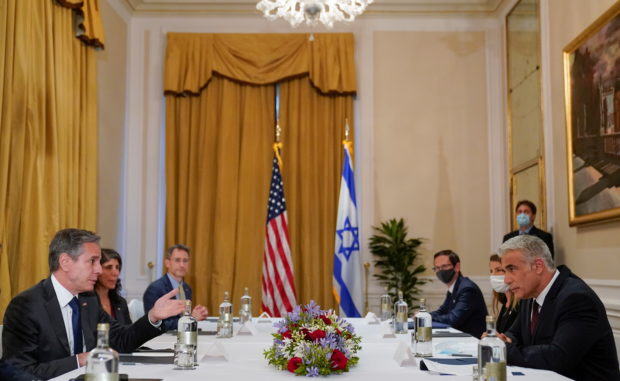Israel tells US it has serious reservations about Iran nuclear deal

U.S. Secretary of State Antony Blinken meets with Israeli Foreign Minister Yair Lapid in Rome, Italy, June 27, 2021. REUTERS
ROME — Israel has serious reservations about the Iran nuclear deal being put together in Vienna, new foreign minister Yair Lapid told his American counterpart, as he pledged to fix “the mistakes made” in U.S.-Israeli relations in recent years.
In their first face-to-face meeting since Israel’s new government was sworn in two weeks ago, U.S. Secretary of State Antony Blinken and Lapid had a very positive and warm discussion, according to U.S. officials.
The main topics were the nuclear deal and Israel’s normalization accords with Gulf Arab states, as well as humanitarian aid to Gaza and the status of East Jerusalem, a topic that helped fuel the latest wave of violence between the Israelis and Palestinians in May.
“Israel has some serious reservations about the Iran nuclear deal that is being put together in Vienna. We believe the way to discuss those disagreements is through direct and professional conversations, not in press conferences,” Lapid said in brief remarks ahead of the meeting in Rome.
Iran and the United States have been holding indirect talks on reviving the 2015 nuclear deal between Tehran and major powers that imposed restrictions on Tehran’s nuclear activities in exchange for lifting international sanctions.
The United States, under former President Donald Trump, abandoned the deal and reimposed harsh U.S. sanctions, prompting Iran to respond by violating many of its restrictions.
Blinken told Lapid that Washington would remain in close contact with Israel over the Iran negotiations, U.S. officials said.
Israeli Prime Minister Naftali Bennett, a nationalist atop a cross-partisan coalition, has hewed to the opposition of his conservative predecessor, Benjamin Netanyahu, to the 2015 Iranian nuclear deal, whose caps on projects with bomb-making potential Israel deemed too lax.
Netanyahu’s particularly close ties with Trump followed an acrimonious relationship with his predecessor Barack Obama, which some critics said had alienated Democrats and compromised U.S. bipartisan support for Israel.
Biden, since taking office on Jan. 20, has repeatedly expressed Washington’s support for Israel but has been more measured in his approach than Trump.
Lapid acknowledged the need for repair. “In the past few years, mistakes were made. Israel’s bipartisan standing was hurt. We will fix those mistakes together.”
Blinken also reiterated to Lapid Washington’s concerns over Israeli attempts to evict several Palestinian families in East Jerusalem, and the status of the city’s al-Aqsa Mosque, Islam’s third holiest site, during the Muslim holy month of Ramadan, U.S. officials said.
Blinken also conveyed to Lapid the necessity of getting humanitarian assistance into Gaza, where 250 Palestinians were killed and scores of buildings were destroyed last month by Israeli air strikes.
Biden has worked to repair ties with the Palestinians and abandon what they said was the one-sided U.S. policy towards the conflict. His administration has pledged to resume hundreds of millions of dollars in economic and humanitarian assistance and work toward reopening the Palestinians’ diplomatic mission in Washington.
Israel’s normalization agreements with various Arab countries were also discussed. In his opening remarks, Blinken said he hoped more participants would join.
The UAE and Bahrain established ties with Israel last year in U.S.-brokered deals called the Abraham Accords, becoming the first Arab states in more than a quarter of a century to break what had been a long-standing taboo in the region.
Lapid, who also met in Rome with Bahrain’s foreign minister, Abdullatif Al-Zayani, is due to visit the UAE on Tuesday and Wednesday. Lapid described the accord as historic and said, “I hope it will be the first of many.”